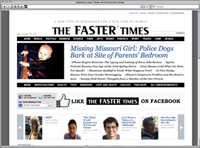Launched in July 2009, The Faster Times has enticed readers through reader-supported investigations, niche coverage of topics like dance, and a menagerie of reporting and opining voices on a wide variety of subjects–all of this in addition to the site’s unorthodox subscriber perks. The methods may be unusual, but the goal is familiar: The Faster Times hopes “to create a new model for the newspaper.”
As of yet, though, the site has struggled to find a solid financial footing. The publication, founded by Sam Apple, former director of interactive media at Nerve.com, is trying to engage readers in less formal ways and include them in the journalistic effort, while also looking for revenue streams beyond subscriptions and banner ads.
So by this spring, Apple had partnered with a boutique advertising firm in SoHo, farming out marketing jobs to his writers–such as a blog for British Airways targeting small businesses–and thus funneling additional paid work to contributors while earning a broker’s fee for the website.
“It was a way to bring in revenue and for our writers to make some money while keeping the site going, which is our focus,” he says.
Balancing the economic and journalistic demands has been the clutch trick for this publication, which offers, for now, primarily commentary on issues that range from the international to the backyard, with a strong emphasis on theater and the arts.
“Predictably, sports and entertainment stuff do the most traffic,” Apple says. “How much emphasis to place on pure quality, how much on traffic, is a balance all publications have to manage.”
Many of The Faster Times contributors have written for the most prominent old media outlets, but the lean years of the recent past have freed up the talent and time to work on an upstart publication that admittedly pays “modestly”, as Apple puts it. Faster Times writers are paid primarily based on the traffic garnered by their stories.
Given the modest pay, The Faster Times has been challenged to move beyond commentary to more resource-intensive original reporting.
In an effort to foster more in depth reporting efforts, the site has launched a new feature called “reader investigations”. The feature experiments with a combination of professional reporting and editor-steered crowdsourcing, hoping to find a topic of deep interest to readers, and thus attract both page views and participation. The first investigation focused on the store-brand foods for sale at Trader Joe’s and Walmart, and revealed questionable product sourcing and misleading marketing that led shoppers to believe, for instance, that orange roughy, a fish officially “red-listed” as vulnerable to exploitation, was a sustainable stock. The package drew extensive participation and a broad audience. “It was something that everybody could relate to,” he says.
The second investigation, on the growing prominence of nanoparticles in the manufacturing of clothes and other consumables, didn’t attract the same crowd-sourcing resources or, ultimately, page views, as the generic foods investigation did.
Since then, the website has been steadily adding content to its array of verticals, from “business” to “nonsense“–including “the best of Yahoo! Answers“–to “love and death,” “music,” “college” and “food.”
The Faster Times hosts a valuable–if loosely curated–assemblage of musings on current events and goings on, and interesting, if infrequent, original reporting and investigations on important topics.
Even if additional readers and advertisers don’t materialize, the site has built in a series of backstops to provide new revenue and capitalize on its stable of seasoned writers. It may not be the traditional way of monetizing talent, but traditional and monetized are two words rarely seen in the same sentence these days.
 NEW YORK, NEW YORK — For a twenty-eight dollar “membership” in The Faster Times, you can get a critique of your dating profile by the publication’s sex and dating expert, Meghan Pleticha.
NEW YORK, NEW YORK — For a twenty-eight dollar “membership” in The Faster Times, you can get a critique of your dating profile by the publication’s sex and dating expert, Meghan Pleticha.
